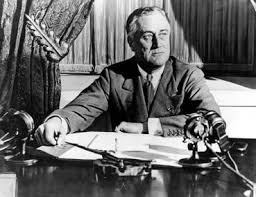Roosevelt had a very good memory for points that had been deeply impressed upon him. Perkins made sure to give him a detailed outline of her presentations in order that he would recall the most important points. He also recalled the human details of people he had met and things he had seen; so too he recalled things told to him by his wife from her work as his eyes and ears. These inputs were perhaps more important than his formal education, the books he was reading, or formal memos coming to him from subordinates.
While he recognized that the majority could be wrong, he tended to want to go with a majority where it existed. He was concerned with the politics of decisions, not merely with the public impact that a program under consideration might have.
She describes him as starting a decision from some specific point, going on to develop other aspects from that point until he had completed an overall program design. This would be contrasted to starting from an overall plan and then filling in the details.
She describes him as depending more on the analysis and views of trusted people than on detailed understanding of the issues himself. Perhaps the extreme aspect of this approach was in the atomic bomb decision. The possibility of the bomb was explained to him by Albert Einstein and Roosevelt's science advisor, and he approved the Manhattan Project based on his trust of their judgement more than on his own understanding achieved through that briefing.
FDR had discussions in his cabinet meetings, wanting to hear different opinions and to see points of view discussed. On the other hand, when cabinet members came to him for permission to go public with new programs or legislation he would often give that permission with a warning that he would not necessarily back the cabinet member if the suggestion became controversial.
While very intelligent, and able to use logical analysis, he also depended on instinct and intuitive judgment. He drew on his memory. He exercised his imagination. He had strong concern for the welfare of the common man. He made decisions exercising all of these faculties.
Perkins also describes FDR as growing through his experience. One gets the impression that when he was a legislator in New York, he thought in terms of New York affairs. His humanity was deepened by his experience with polio and by his recuperation. As Assistant Secretary of the Navy he became more aware of international issues, and living in Georgia and as a Vice Presidential candidate he became more interested in national issues. Of course, in the presidency his knowledge and understanding of national and international issues grew further.
The description seems to suggest a very good approach to decision making, but one that is not discussed in the average guidebook on decision making.

No comments:
Post a Comment